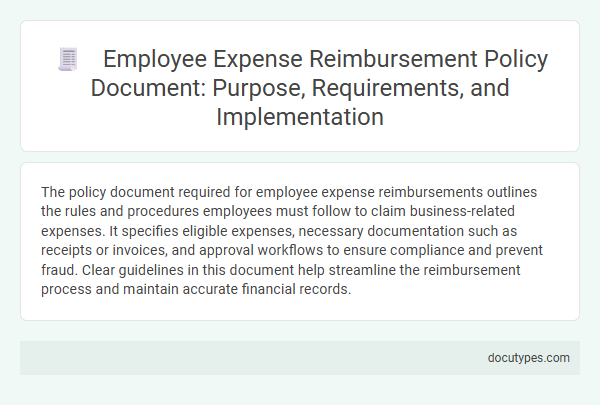The policy document required for employee expense reimbursements outlines the rules and procedures employees must follow to claim business-related expenses. It specifies eligible expenses, necessary documentation such as receipts or invoices, and approval workflows to ensure compliance and prevent fraud. Clear guidelines in this document help streamline the reimbursement process and maintain accurate financial records.
Introduction to Employee Expense Reimbursement Policy
Employee expense reimbursement policies establish clear guidelines for submitting and approving business-related expenses. These policies ensure transparency, accuracy, and compliance in handling your financial claims.
- Purpose of Policy - Defines the scope and rationale for reimbursing employee expenses.
- Required Documentation - Specifies receipts, approvals, and forms needed for reimbursement requests.
- Submission Procedures - Outlines steps employees must follow to submit expense reports correctly.
Understanding the employee expense reimbursement policy helps prevent delays and ensures timely compensation for business expenditures.
Purpose and Objectives of the Policy
A policy document for employee expense reimbursements outlines the rules and procedures for submitting and approving expense claims. It ensures transparency and consistency in handling financial matters related to employee expenditures.
The primary purpose of this policy is to provide clear guidelines on which expenses qualify for reimbursement and the documentation required. It aims to prevent misuse of company funds by setting limits and approval workflows. You benefit from understanding these objectives to efficiently manage your expense submissions and avoid delays.
Scope and Eligibility Criteria
The policy document required for employee expense reimbursements outlines the approved scope and eligibility criteria to ensure compliance and consistency. It defines which expenses qualify for reimbursement and who is authorized to submit claims under the organization's guidelines.
- Scope of Expenses - Covers travel, meals, lodging, and business-related purchases necessary for job functions.
- Eligibility Criteria - Applies exclusively to full-time and part-time employees with valid employment status during the expense period.
- Required Documentation - Includes original receipts, approval forms, and expense reports submitted within the specified timeframe.
Types of Reimbursable Expenses
What is the policy document required for employee expense reimbursements? The policy document outlines the types of reimbursable expenses and ensures compliance with company standards. It provides clear guidelines on allowable costs such as travel, meals, and office supplies to streamline the reimbursement process for your claims.
Non-Reimbursable Expenses
A policy document for employee expense reimbursements clearly outlines the types of expenses eligible for reimbursement and those that are non-reimbursable. Common non-reimbursable expenses include personal purchases, alcohol, entertainment not related to business, and fines or penalties. Your organization must specify these exclusions to ensure transparency and prevent misuse of company funds.
Expense Submission Procedures
Policy documents for employee expense reimbursements establish the required guidelines for submitting expenses to ensure accuracy and compliance. These documents detail the process for submitting receipts, approval workflows, and eligible expense categories.
Expense submission procedures typically require you to provide original receipts and fill out a standardized expense report within a specified timeframe. Timely and complete submissions help facilitate prompt reimbursement and maintain financial accountability.
Required Documentation and Receipts
A policy document for employee expense reimbursements outlines the required documentation and receipts necessary for claim approval. It specifies that employees must submit original receipts or digital copies as proof of purchase, including date, amount, and vendor details. This ensures accuracy, transparency, and compliance with company financial regulations.
Approval Workflow and Responsibilities
The policy document required for employee expense reimbursements outlines the approval workflow and clearly defines responsibilities to ensure accountability and compliance. It specifies the steps for submitting, reviewing, and authorizing expense claims.
- Approval Hierarchy - The document establishes a structured approval hierarchy involving direct supervisors and finance officers to validate expenses.
- Employee Responsibility - Employees are required to submit accurate and complete expense reports accompanied by valid receipts.
- Compliance Monitoring - Managers and finance departments are responsible for monitoring adherence to reimbursement policies and flagging any discrepancies.
Reimbursement Timelines and Methods
The policy document required for employee expense reimbursements outlines the necessary procedures to submit claims accurately. It details the specific reimbursement timelines and acceptable methods for payment processing.
Reimbursement timelines typically mandate submission within 30 days of the incurred expense to ensure prompt processing. Payment methods include direct bank deposits or company-issued prepaid cards to facilitate seamless transactions for Your convenience.
What Is the Policy Document Required for Employee Expense Reimbursements? Infographic

